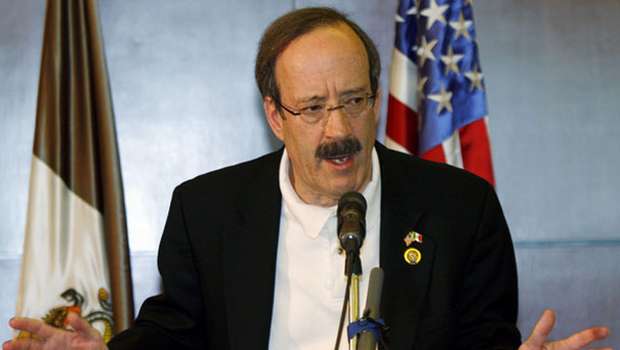Washington, Asharq Al-Awsat—For many foreigners, one of the most striking—yet often overlooked—features of the US political system is the impact that the US Congress can have on foreign policy.
One of the key players in this regard is, perhaps unsurprisingly, the House of Representatives Foreign Affairs Committee, which has sought to take a leading role in shaping US policy towards Iran.
Recently, Asharq Al-Awsat spoke to the second-most senior member of the Foreign Affairs Committee, Representative Eliot Engel, in his office in Washington about Congressional attempts to toughen the US sanctions regime.
Engel, a Democrat, represents the 16th New York Congressional District, and recently introduced the Nuclear Iran Prevention Act with his colleague, Ed Royce (R-CA). The bill would broaden economic sanctions on Tehran, as well as increase oversight and enforcement of existing sanctions, while negotiations over Iran’s nuclear program continue.
Asharq Al-Awsat: Amid hopes for a negotiated settlement with Tehran over its nuclear program, some American policymakers view Iranian president Hassan Rouhani as a “moderate.” What’s your view?
Eliot Engel: That’s ridiculous, and Rouhani in my opinion is not a moderate. The Supreme Leader Ayatollah Ali Khamenei is the final arbiter, and before the last Iranian elections he disqualified all the moderates. What brought Iran to the negotiating table was sanctions, which placed their economy in shambles.
Q: You’ve been a strong proponent of maintaining financial pressure on Tehran while negotiations continue over its nuclear program. What is the state of Congressional efforts to re-impose sanctions on the regime?
We passed last summer in the House the Royce–Engel Bill, which slapped the strongest sanctions on Iran yet. The Senate unfortunately did not follow suit, and it was only when these negotiations with Iran—[and] the P5+1—were taking place, that we started hearing some rumblings from the Senate about a different sanctions bill. First we heard about immediate sanctions, then we heard about a delayed sanctions bill that would kick-in six months later if Iran didn’t negotiate an agreement in good faith. But unfortunately, the administration is opposed to that as well.
Q: In the meantime, how do you see the negotiations proceeding?
My main problem with these negotiations—although I support them and I hope they work—is that Iran continues to enrich while we’re talking with them. I think it would not have been too much to say to the Iranians, “While we’re talking, you stop enriching.” If the whole purpose of the talk is that in the end, Iran will not have a nuclear weapon, then why are we allowing them to enrich while we’re talking? They lied about their program being for peaceful purposes. That’s a lie and we all know it’s a lie, and I don’t think we can believe what they say.
Q: Do you think that negotiations with Iran will lessen tensions in the Gulf, or bring an end to Iranian support for Hezbollah and Hamas?
Unfortunately, I think the chance of that is about zero. That’s also what bothers me about this. We’re negotiating with Iran on their nuclear program, and Iran is carrying out business as usual. They’re sending Hezbollah into Syria, and Hezbollah has turned the tide in the civil war in favor of [Syrian President Bashar] Al-Assad. They continue to make mischief wherever they can, and at same time we’re negotiating with them. It seems to me that these things are tied in to one another. It’s as if we’ve put blindfolds on and said to Iran, “We’re going to forget about all the mischief you’re causing, like being the world’s leading supporter of terrorism and turning the tide in favor of Assad.” I think it sends a bad message to them. It bothers me.
Q: What is your opinion of September’s UN-brokered agreement for the disarmament of chemical weapons in Syria?
I’m told that only 11 percent of the weapons have been destroyed. Meanwhile, Assad is still making war on his own people, with barrel bombs that either kill them or cut them up if they’re not killed, using starvation as a weapon of war and of course gassing his people. The world should not just wring its hands and say that they can’t do anything. It’s not easy, but we can do something and we should do something—first, because the Syrian people deserve better; second, because the humanitarian crisis threatens to destabilize Jordan through the inflow of refugees; and third, because foreign jihadists exploiting lawless sections of Syria represent an existential threat to the US and its allies.
Q: Some Americans argue that military aid to Syrian rebels would not lead to a desirable outcome. Do you agree?
When I introduced my bill over a year ago, I was convinced that if we provided aid to the Free Syrian Army, they would become the preeminent people fighting in the war. Now the worry is that if you intervene in Syria and you help the people fighting Assad, you may be inadvertently giving weapons to the jihadists. But after speaking with the King of Jordan [King Abdullah II] and others, I think the Free Syrian Army in the southern part of Syria can still be helped, and I think we have to find a way of doing it. I don’t support US boots on the ground, but I would support the possible use of targeted air strikes to weaken Assad and to let the Iranians know that we’re not going to sit idly by.

